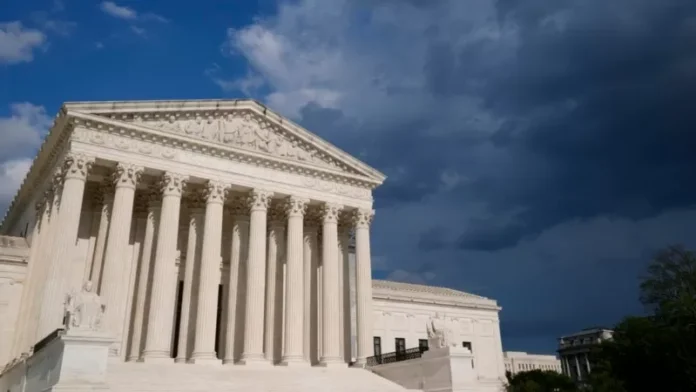WASHINGTON — The federal courts have made the decision not to refer allegations against Supreme Court Justice Clarence Thomas to the Justice Department, the judiciary’s governing body announced on Thursday.
In response to demands from Democratic senators for an investigation into potential violations of ethics laws by Justice Thomas, the U.S. Judicial Conference stated that Thomas has agreed to comply with updated requirements for reporting trips and gifts. This includes clearer guidelines for accepting hospitality from friends.
This decision comes after years of controversy surrounding Thomas’ failure to disclose numerous trips and gifts that were paid for by wealthy friends, such as Republican megadonor Harlan Crow. Thomas has argued that these individuals are personal friends and therefore their gifts and hospitality do not need to be disclosed. The Supreme Court has not yet responded to requests for comment on this matter.
In 2023, the Supreme Court adopted its first code of ethics in the face of ongoing criticism. However, the code still lacks a means of enforcement. U.S. District Judge Robert Conrad, who serves as secretary for the U.S. Judicial Conference, stated that it is unclear whether the law allows for the Conference to make a criminal referral in regards to a Supreme Court justice.
Judge Conrad also noted that a criminal referral in this case is unnecessary, as two Democratic senators have already called on Attorney General Merrick Garland to appoint a special counsel to investigate the matter over the summer. However, there has been no public announcement of such an appointment.
The organization Fix the Court, which advocates for transparency in the Supreme Court, stated that the financial disclosure law is clear and should apply to justices. Executive Director Gabe Roth said in a statement, “The Conference’s letters further underscore the need for Congress to create a new and transparent mechanism to investigate the justices for ethics violations, since the Conference is unwilling to act upon the one method we had presumed existed to do so.”
Judge Conrad also responded to a separate complaint from the conservative legal group, the Center for Renewing America, regarding Justice Ketanji Brown Jackson’s initial failure to disclose the source of her husband’s consulting income. However, Jackson has since amended her disclosures and agreed to updated reporting requirements.
This decision by the U.S. Judicial Conference has sparked debate among legal experts and politicians. Some argue that the lack of enforcement for the Supreme Court’s code of ethics undermines the integrity of the judicial system. Others argue that the code should not apply to the Supreme Court, as it could potentially compromise the independence of the justices.
Despite this controversy, it is clear that steps need to be taken to ensure transparency and accountability within the Supreme Court. The U.S. Judicial Conference’s decision to not refer the allegations against Justice Thomas to the Justice Department highlights the need for a new mechanism to investigate potential ethics violations by Supreme Court justices.
In this regard, it is now up to Congress to take action and create a transparent and effective process for investigating these matters. The American people deserve to have confidence in the integrity of the highest court in the land, and it is the responsibility of our government to ensure that this trust is not compromised.
While the Conference’s decision may be disappointing to some, it is important to recognize that Justice Thomas has agreed to comply with the updated reporting requirements. This is a step in the right direction towards greater transparency and accountability within the Supreme Court.
It is also encouraging to see Justice Ketanji Brown Jackson taking responsibility for her initial failure to disclose her husband’s income source and agreeing to updated reporting requirements. This shows a willingness to adhere to the code of ethics and maintain the high standards expected of Supreme Court justices.
In the end, the U.S. Judicial Conference’s decision serves as a reminder that our government institutions must constantly strive towards transparency and accountability. It is imperative that Congress takes action to address this issue and ensure that the Supreme Court remains a symbol of justice and integrity for all Americans.

